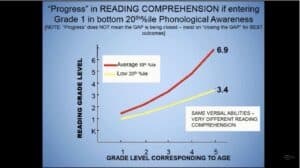Ten Questions To Ask at Teacher Conferences When Your Child Struggles with Reading and Spelling
From preschool through fourth grade, my son struggled with reading, writing, and spelling. At the time, I wasn’t sure what to ask during teacher conferences. After years of research and working with many children who face similar challenges, I’ve learned which questions parents need to ask to uncover the root causes of reading difficulties. The answers to these questions can guide you toward the programs and solutions that will help your child become a better reader and speller.
Key Questions to Ask:
- How well does my child know their letter sounds?
Understanding letter sounds is fundamental to reading and spelling. Are they familiar with all of the sounds each letter makes? - Can my child decode and sound out unknown words?
Is your child able to break words into their individual sounds and blend them together to read unfamiliar words? - How well does my child read nonsense words?
Nonsense words are great indicators of a child’s ability to decode words based on phonetic patterns. - Can my child identify vowel sounds in the middle of words?
Vowel sounds can be tricky. Is your child able to identify the correct vowel sounds in words, especially in the middle? - Is my child on track with learning their sight words?
Sight words don’t follow typical phonetic rules. Are they learning the required words for their grade level? - Is my child an accurate reader, or do they guess at words?
Does your child skip small, common words or guess based on context, yet still manage to comprehend the passage? - Is my child progressing at a similar rate as their peers?
Are they making progress at the same pace as other students in the class? - Does my child struggle with reading comprehension or vocabulary?
Is understanding what they read a challenge, or do they have difficulty with word meanings? - Why is my child struggling with reading comprehension and vocabulary?
Ask for specifics on what’s hindering your child’s comprehension and vocabulary growth. - How are you addressing these challenges?
Find out what interventions or strategies are being used to help your child. - Does the school screen for dyslexia?
If your child is struggling with reading, ask whether dyslexia screening is part of the school’s process.
What to Watch Out For:
If your child is struggling, don’t accept these common answers:
- “They will grow out of it.”
- “Some kids struggle but catch up later.”
- “It’s too early to worry.”
- “Dyslexia is an outdated diagnosis.”
Research shows that early intervention is key. The sooner children receive help, the less time they’ll need to catch up. Children who are slightly behind in Kindergarten or First Grade typically do not catch up without targeted intervention. Waiting to address the problem often leads to longer struggles down the road.

Understanding the Root Cause:
- Dyslexia and ADHD
Dyslexia is the most common reason children struggle with reading, affecting up to 80% of kids with reading difficulties. It’s also important to know that dyslexia and ADHD share 16 symptoms in common. In fact, 66% of children with ADHD also have another learning disorder. Dyslexia can sometimes be mistaken for inattention, so be proactive in investigating it. - Take a Dyslexia Screening
Consider taking a free dyslexia screening to see if your child shows signs of dyslexia. If they score highly (more than 10 symptoms), it’s worth pursuing a formal evaluation. - Seek Private Tutoring
Public schools often lack the resources or methods to adequately address dyslexia. Private tutoring may be necessary. Look for tutors or centers who use Orton-Gillingham Programs with fidelity. This structured, multisensory approach has proven effective for children with dyslexia. With two years of Orton-Gillingham tutoring, many children can reach grade-level reading. - Choose the Right Approach
It’s crucial that the tutoring program is delivered one-on-one, for 90-120 minutes per week, which many schools and chain tutoring centers fail to do. Orton-Gillingham, when implemented correctly, is one of the best methods for teaching children with dyslexia.
Take Action:
If you have any further questions about dyslexia or how to support your child’s reading struggles, feel free to reach out. Early intervention is critical, and with the right approach, your child can overcome these challenges. Have questions – click here!
